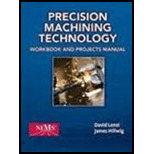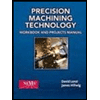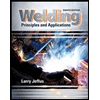
Precision Machining Technology (MindTap Course List)
2nd Edition
ISBN: 9781285444543
Author: Peter J. Hoffman, Eric S. Hopewell, Brian Janes
Publisher: Cengage Learning
expand_more
expand_more
format_list_bulleted
Textbook Question
Chapter 5.2, Problem 2RQ
The most common variation of the above chuck has how many jaws?
Expert Solution & Answer
Want to see the full answer?
Check out a sample textbook solution
Students have asked these similar questions
PROBLEM 3.46
The solid cylindrical rod BC of length L = 600
mm is attached to the rigid lever AB of length a
= 380 mm and to the support at C. When a 500
N force P is applied at A, design specifications
require that the displacement of A not exceed
25 mm when a 500 N force P is applied at A
For the material indicated determine the
required diameter of the rod.
Aluminium: Tall = 65 MPa, G = 27 GPa.
A
Find the equivalent mass of the rocker arm assembly with respect to the x coordinate.
k₁
mi
m2
k₁
2. Figure below shows a U-tube manometer open at both ends and containing a column of liquid
mercury of length l and specific weight y. Considering a small displacement x of the manometer
meniscus from its equilibrium position (or datum), determine the equivalent spring constant associated
with the restoring force.
Datum
Area, A
Chapter 5 Solutions
Precision Machining Technology (MindTap Course List)
Ch. 5.1 - List the four main parts of the engine lathe.Ch. 5.1 - What are the two main purposes of the lathe...Ch. 5.1 - What part of the lathe is used to set the feed...Ch. 5.1 - Prob. 4RQCh. 5.1 - Prob. 5RQCh. 5.1 - What is the purpose of the leads crew of a lathe?Ch. 5.1 - What two functions can the lathe tailstock...Ch. 5.1 - The standard taper in most lathe tailstocks is the...Ch. 5.1 - Define the swing and the bed length of a lathe.Ch. 5.2 - What is the special name for the type of jaw-type...
Ch. 5.2 - The most common variation of the above chuck has...Ch. 5.2 - Name two material shapes that can be properly held...Ch. 5.2 - List two advantages of using a self-centering...Ch. 5.2 - Name two material shapes that can be properly held...Ch. 5.2 - List three benefits of holding a workpiece between...Ch. 5.2 - List three potential advantages of using an...Ch. 5.2 - List three characteristics of a workpiece that...Ch. 5.2 - What type of mandrel would be ideal for gripping a...Ch. 5.2 - Name the type of tailstock center that raid be...Ch. 5.2 - What two auxiliary devices can be used to...Ch. 5.2 - Explain the differences between the two auxiliary...Ch. 5.2 - Name the device that is used to transmit the...Ch. 5.2 - Which two tool posts are the most efficient if...Ch. 5.2 - Which device may be used for either toolholding or...Ch. 5.3 - If a 0.050" depth of cut is taken on the diameter...Ch. 5.3 - A lathe cross slide uses a diameter-reading...Ch. 5.3 - In what units are feed rates measured for lathe...Ch. 5.3 - Are deeper cuts used for roughing or finishing...Ch. 5.3 - Calculate spindle RPM and machining time for...Ch. 5.3 - List three safety precautions related to clothing...Ch. 5.3 - What two materials are most commonly used for...Ch. 5.3 - What feature of a lathe cutting tool has a direct...Ch. 5.3 - Is a left-hand or right-hand tool normally used...Ch. 5.3 - What part of the lathe is used to feed the tool...Ch. 5.3 - When facing, why should the tool not be fed past...Ch. 5.3 - Should a left-hand or right-hand tool be used when...Ch. 5.3 - When and how should chips he removed from the work...Ch. 5.3 - What are two reasons for center drilling on the...Ch. 5.3 - When drilling and reaming on the lathe, how are...Ch. 5.3 - How can hole depth be controlled during drilling...Ch. 5.3 - What are two reasons boring may be selected to...Ch. 5.3 - Why must extra care be taken when performing...Ch. 5.3 - How can a tap be aligned when threading a hole on...Ch. 5.3 - Briefly define form cutting.Ch. 5.3 - How do grooving and cutoff speeds compare to...Ch. 5.3 - How can tool binding be overcome when cutting deep...Ch. 5.3 - List the two basic knurl patterns.Ch. 5.3 - How is knurling different from other lathe...Ch. 5.3 - List and briefly describe the two different types...Ch. 5.4 - The distance of actual contact of two mating...Ch. 5.4 - What feature of mating threads determines the...Ch. 5.4 - How many classes of fit are there in the Unified...Ch. 5.4 - Determine the major diameter limits for the...Ch. 5.4 - Determine the minor diameter limits for the...Ch. 5.4 - Determine the pitch diameter limits for the...Ch. 5.4 - Determine the approximate compound-rest in-feed...Ch. 5.4 - What is the name for the rotating device that...Ch. 5.4 - When threading, what is the reason for feeding the...Ch. 5.4 - Prob. 10RQCh. 5.4 - Why should the depth of cut be reduced for each...Ch. 5.4 - What dimension of the thread is measured by using...Ch. 5.4 - What measuring tool is used to visually inspect...Ch. 5.4 - List two applications of Acme threads.Ch. 5.4 - What type of thread is machined on a tapered...Ch. 5.5 - Briefly define a taper.Ch. 5.5 - What is the difference between an included angle...Ch. 5.5 - What does TPI stand for in relation to tapers?Ch. 5.5 - What are the TPI and TPF of a part with end...Ch. 5.5 - What are the corresponding centerline and included...Ch. 5.5 - What is the corresponding centerline angle of a...Ch. 5.5 - What is the limitation of the tool bit taper...Ch. 5.5 - What must be known to use the compound-rest taper...Ch. 5.5 - What taper turning methods allow use of the lathes...Ch. 5.5 - What two steps can be taken to eliminate backlash...Ch. 5.5 - The TPI specified on a print is 0.030". If...Ch. 5.5 - If TPF is 0.42", how much movement should register...Ch. 5.5 - What is the benefit of using the offset tailstock...Ch. 5.5 - What are two ways to reduce uneven pressure on...Ch. 5.5 - Calculate tailstock setover for a 13.5" part with...
Knowledge Booster
Learn more about
Need a deep-dive on the concept behind this application? Look no further. Learn more about this topic, mechanical-engineering and related others by exploring similar questions and additional content below.Similar questions
- 1. The consequences of a head-on collision of two automobiles can be studied by considering the impact of the automobile on a barrier, as shown in figure below. Construct a mathematical model (i.e., draw the diagram) by considering the masses of the automobile body, engine, transmission, and suspension and the elasticity of the bumpers, radiator, sheet metal body, driveline, and engine mounts.arrow_forward3.) 15.40 – Collar B moves up at constant velocity vB = 1.5 m/s. Rod AB has length = 1.2 m. The incline is at angle = 25°. Compute an expression for the angular velocity of rod AB, ė and the velocity of end A of the rod (✓✓) as a function of v₂,1,0,0. Then compute numerical answers for ȧ & y_ with 0 = 50°.arrow_forward2.) 15.12 The assembly shown consists of the straight rod ABC which passes through and is welded to the grectangular plate DEFH. The assembly rotates about the axis AC with a constant angular velocity of 9 rad/s. Knowing that the motion when viewed from C is counterclockwise, determine the velocity and acceleration of corner F.arrow_forward
- 500 Q3: The attachment shown in Fig.3 is made of 1040 HR. The static force is 30 kN. Specify the weldment (give the pattern, electrode number, type of weld, length of weld, and leg size). Fig. 3 All dimension in mm 30 kN 100 (10 Marks)arrow_forward(read image) (answer given)arrow_forwardA cylinder and a disk are used as pulleys, as shown in the figure. Using the data given in the figure, if a body of mass m = 3 kg is released from rest after falling a height h 1.5 m, find: a) The velocity of the body. b) The angular velocity of the disk. c) The number of revolutions the cylinder has made. T₁ F Rd = 0.2 m md = 2 kg T T₂1 Rc = 0.4 m mc = 5 kg ☐ m = 3 kgarrow_forward
- (read image) (answer given)arrow_forward11-5. Compute all the dimensional changes for the steel bar when subjected to the loads shown. The proportional limit of the steel is 230 MPa. 265 kN 100 mm 600 kN 25 mm thickness X Z 600 kN 450 mm E=207×103 MPa; μ= 0.25 265 kNarrow_forwardT₁ F Rd = 0.2 m md = 2 kg T₂ Tz1 Rc = 0.4 m mc = 5 kg m = 3 kgarrow_forward
- 2. Find a basis of solutions by the Frobenius method. Try to identify the series as expansions of known functions. (x + 2)²y" + (x + 2)y' - y = 0 ; Hint: Let: z = x+2arrow_forward1. Find a power series solution in powers of x. y" - y' + x²y = 0arrow_forward3. Find a basis of solutions by the Frobenius method. Try to identify the series as expansions of known functions. 8x2y" +10xy' + (x 1)y = 0 -arrow_forward
arrow_back_ios
SEE MORE QUESTIONS
arrow_forward_ios
Recommended textbooks for you
 Precision Machining Technology (MindTap Course Li...Mechanical EngineeringISBN:9781285444543Author:Peter J. Hoffman, Eric S. Hopewell, Brian JanesPublisher:Cengage Learning
Precision Machining Technology (MindTap Course Li...Mechanical EngineeringISBN:9781285444543Author:Peter J. Hoffman, Eric S. Hopewell, Brian JanesPublisher:Cengage Learning Welding: Principles and Applications (MindTap Cou...Mechanical EngineeringISBN:9781305494695Author:Larry JeffusPublisher:Cengage Learning
Welding: Principles and Applications (MindTap Cou...Mechanical EngineeringISBN:9781305494695Author:Larry JeffusPublisher:Cengage Learning

Precision Machining Technology (MindTap Course Li...
Mechanical Engineering
ISBN:9781285444543
Author:Peter J. Hoffman, Eric S. Hopewell, Brian Janes
Publisher:Cengage Learning

Welding: Principles and Applications (MindTap Cou...
Mechanical Engineering
ISBN:9781305494695
Author:Larry Jeffus
Publisher:Cengage Learning
HOME SHOP JIGS & FIXTURES PART 1, TYPES OF JIGS & ACCESSORIES AND THE THEORIE BEHIND THE TOOLS; Author: THATLAZYMACHINIST;https://www.youtube.com/watch?v=EXYqi42JimI;License: Standard Youtube License